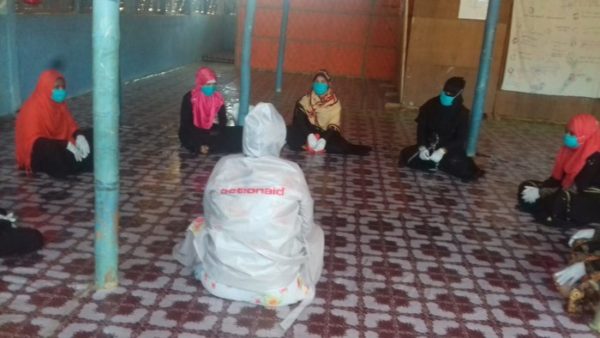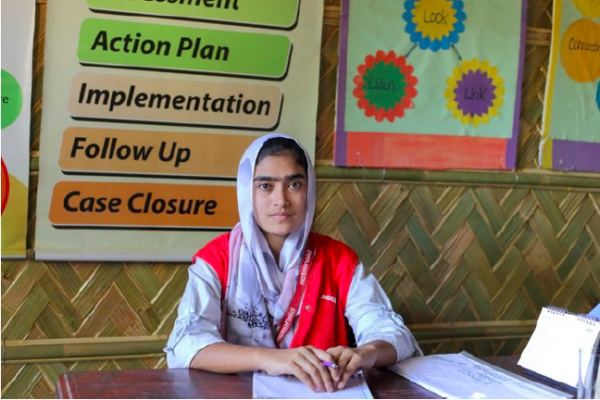Amidst the crowded homes of Bangladesh’s Cox’s Bazar refugee camps, violence is on the rise, says Sharmin Akter. “There is always this ‘pressure cage’ that the women and girls are living in.”
The 21-year-old Case Management Officer for ActionAid Bangladesh has three years experience working in this densely populated camp, supporting Rohingya women who fled mass violence in Myanmar in 2017.
With the first COVID-19 cases now confirmed in the camp, gender-based violence is likely to increase. Women living in the camp are being forced to lockdown in fragile domestic situations as well as being at an increased risk of contracting the virus due to the dense population.
“The biggest danger is that social distance cannot be maintained. That’s why the virus will spread fast in the camp. Homes are overcrowded. Also, homes are packed in next to each other,” says Sharmin.
Under the newly imposed social distancing rules, those living in the camp are required to spend more time in these cramped living conditions. The stress of the virus having reached the camp alongside growing food insecurity has heightened tensions and according to Sharmin, gender-based violence has “massively-increased”.
In response to this rise in gender-based violence, Sharmin and ActionAid Bangladesh have led the creation of women-friendly spaces across the camp. This essential service links survivors of violence to food, medical support and psychosocial counselling.

The women-friendly space also acts as a vital information hub, relaying life-saving health advice to women so they can protect themselves and their families from the virus. As well as leading demonstrations on good hygiene practices and social distancing, it is also actively fighting misinformation in the camp.
“We take a group of seven or eight women and or adolescent girls and we hold an awareness-raising session for them. We show them how to use the gloves and masks and how to maintain social distancing,” shares Sharmin.
With COVID-19 spreading through the camp, Sharmin acknowledges the ongoing risk of working in Cox’s Bazar, admitting that her family didn’t want her to continue her work. However, she reassured them that ActionAid (with support from the Australian Government through the Australian NGO Cooperation Program (ANCP)) had provided the necessary training and Personal Protective Equipment (PPE) to keep her, her colleagues and her family safe.

Sharmin says she feels fortunate to be able to go to the camp and help people.
“If we don’t go and help the people in the camp, then it will be really bad for them. They’ve already suffered so much. They need to know people are there to help them”.
Women like Sharmin are on the frontlines of the Coronavirus in some of the world’s most vulnerable communities. Now as COVID-19 reaches Cox’s Bazar Rohingya refugee camp, we must protect women facing the double threat of increasing gender-based violence and the spread of coronavirus in their community.